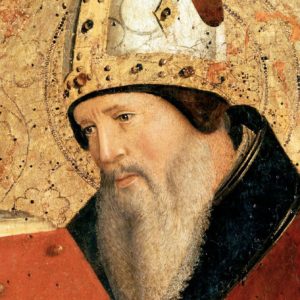
One of the things that most fascinated me about Augustine and his mistress, and made me want to write about them, was the time in which they lived. It was a turning point: the end of the Roman Empire and the start of what we call the Dark Ages, the time when the Ancient World collapsed and the Christian Era began.
The Christian church was still deciding what orthodoxy would consist of. Heresies abounded: Pelagianism, Arianism, Appolonianism, the Donatist heresy that forms much of the backdrop for Part One of The Saint’s Mistress.
Non-Christian influences on early Christian thought, and on Saint Augustine in particular, included Stoicism, Platonism and especially neo-Platonism – and, of course, Manicheism. Augustine had an excellent education in what we now call the classics. He would have read books that are now lost to us, such as Cicero’s Hortensius, which taught that happiness comes from studying philosophy.
Neo-Platonism was ascendant among the Milan intelligentsia during Augustine’s time there. By the time he arrived in Milan in 384, Trinitarian Christianity was established as the official state religion, but the court intellectuals tried to steer a skeptical course between Christianity and pagan philosophy. These men (of course, they were almost all men) were not so different from many modern thinkers. They liked feeling like they had control over their lives. They had a hard time with the surrender required of Christians, the notion that we are redeemed only by Christ’s blood, not by our own acts. Even long after he repudiated the Manichees, Augustine himself clung very hard for a while to the notion that man could somehow “ascend” through study and philosophy.
It was also a time of great turmoil. During Augustine’s time in Milan, legions were usually posted both inside and outside the city walls, to defend against the Barbarian invaders who regularly crossed the Alps from present-day Germany, seeking plunder. The Empire was crumbling, and that became clearer over the course of Augustine’s long life. The legions were progressively withdrawn from the further reaches, such as the border area between the North African provinces of the Empire and tribal central Africa.
Taxes were high and growing higher. The class divide was wide and growing wider. The rich had indoor plumbing, central heating, walls and flooring or rich mosaic tile, and multiple slaves. The growing class of urban poor slept in the porticos surrounding the outer courtyards of churches. Crime was on the increase, as small farmers were forced off their land by large landowners, and slaves put the lower classes out of work. Punishment was severe for lower-class people convicted of crimes: they could be buried alive, thrown from a cliff scourged, or sent to the mines or the arena.
In 387, Augustine, Adoedonatus and Monica were delayed in Ostia because the sea lanes were blocked by a war between the eastern & western Roman Empire, sparked the by usurper Maximus. It was during this delay, waiting to embark for a return to North Africa, that Monica died.
And, of course, Augustine’s life ended during the siege of Hippo Regius, led by the Visgoth Alaric, an Arian heretic who had already sacked Rome and present-day Spain, then crossed the Gibralter Strait to bring war, plague & pestilence to North Africa.
In my book, I portray Aurelius Augustine and his fellow intellectuals living in the midst of this turmoil and understanding that the classical world order was ending. The power and importance of the Christian church was on the rise. Quintus sees the Church as his ticket to power and comfort. Others turn to the Church as a comforter and protector in a tumultuous time. These are practical and understandable reactions and don’t necessarily exclude the possible truth of the Christian message. God can work in mysterious ways his wonders to perform. But, I felt that my main characters had to be morally an intellectually convinced. Leona is an honest woman, and Aurelius Augustine is a passionate seeker of truth. I didn’t think it would honor them to have them become Christians for any reason other than that they were convinced of its truth.
